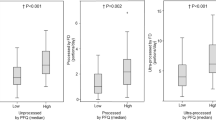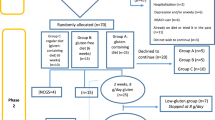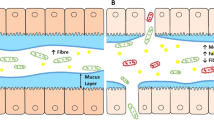Abstract
Survey aims were to investigate the dietary concerns, beliefs and opinions of people with inflammatory bowel disease (IBD), and differences between those with Crohn’s disease (CD) or ulcerative colitis (UC). A cross-sectional postal questionnaire was sent to people with IBD who were booked into an adult IBD or Gastroenterology clinic over a 6-week period. There were 416 eligible people and 168 (40%) responded. Sixty-four (42%) people indicated that food affects their symptoms a lot or severely. Eighty (51%) respondents indicated that diet was important or extremely important in controlling symptoms. Significantly more people with CD reported meat, fatty foods, chocolate and salad as a trigger than people with UC. Significantly more people with UC reported wheat as a trigger. More people with CD avoided meat and chocolate than UC. This survey highlights the importance of nutrition and diet to people with IBD. Frequent food avoidance was reported. This may impact on nutrition-related health problems.
This is a preview of subscription content, access via your institution
Access options
Subscribe to this journal
Receive 12 print issues and online access
$259.00 per year
only $21.58 per issue
Buy this article
- Purchase on Springer Link
- Instant access to full article PDF
Prices may be subject to local taxes which are calculated during checkout

Similar content being viewed by others
References
Prince A, Whelan K, Moosa A, Lomer M, Reidlinger D . Nutritional problems in inflammatory bowel disease: the patient perspective. J Crohns Colitis 2011; 5: 443–450.
Geerling B, Badart-Smook A, Stockbrugger R, Brummer R . Comprehensive nutritional status in patients with long-standing Crohn disease currently in remission. Am J Clin Nutr 1998; 67: 919–926.
Ballegaard M, Bjergstrom A, Brondum S, Hylander E, Jensen L, Ladefoged K . Self-reported food intolerance in chronic inflammatory bowel disease. Scand J Gastroenterol 1997; 32: 569–571.
Jowett S, Seal C, Phillips E, Gregory W, Barton J, Welfare MR . and Dietary beliefs of people with ulcerative colitis and their effect on relapse and nutrient intake. Clin Nutr 2004; 23: 161–170.
Joachim G . Responses of people with inflammatory bowel disease to foods consumed. Gastroenterol Nurs 2000; 23: 160–167.
Woolner J, Parker T, Kirby G, Hunter J . The development and evaluation of a diet for maintaining remission in Crohn's disease. J Hum Nutr Diet 1998; 11: 1–11.
Truelove S . Ulcerative colitis provoked by milk. Br Med J 1961; 1: 154–160.
Mishkin S . Dairy sensitivity, lactose malabsorption, and elimination diets in inflammatory bowel disease. Am J Clin Nutr 1997; 65: 564–567.
Leiper K, Woolner J, Mullan M, Parker T, van der Vliet M, Fear S et al. A randomised controlled trial of high versus low long chain triglyceride whole protein feed in active Crohn's disease. Gut 2001; 49: 790–794.
Gruber L, Kisling S, Lichti P, Martin F, May S, Klingenspor M et al. High fat diet accelerates pathogenesis of murine crohn’s disease-like ileitis independently of obesity. PLoS One 2013; 8: e71661.
Zachos M, Tondeur M, Griffiths A . Enteral nutritional therapy for induction of remission in Crohn's disease. Cochrane Database Syst Rev 2007; CD000542.
Keohane J, O'Mahony C, O'Mahony L, O'Mahony S, Quigley E, Shanahan F . Irritable bowel syndrome-type symptoms in patients with inflammatory bowel disease: a real association or reflection of occult inflammation? Am J Gastroenterol 2010; 105: 1789–1794; quiz 1795.
Gearry R, Irving P, Barrett J, Nathan D, Shepherd S, Gibson P . Reduction of dietary poorly absorbed short-chain carbohydrates (FODMAPs) improves abdominal symptoms in patients with inflammatory bowel disease-a pilot study. J Crohns Colitis 2009; 3: 8–14.
Acknowledgements
This research was supported by an Allied Health Professional small grant from Central Manchester Foundation Trust research group.
Author information
Authors and Affiliations
Corresponding author
Ethics declarations
Competing interests
The authors declare no conflict of interest.
Rights and permissions
About this article
Cite this article
Kinsey, L., Burden, S. A survey of people with inflammatory bowel disease to investigate their views of food and nutritional issues. Eur J Clin Nutr 70, 852–854 (2016). https://doi.org/10.1038/ejcn.2016.57
Received:
Revised:
Accepted:
Published:
Issue Date:
DOI: https://doi.org/10.1038/ejcn.2016.57
This article is cited by
-
Working With Patients With Chronic Digestive Diseases
Journal of Health Service Psychology (2021)



